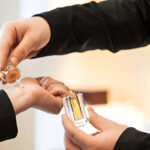It is time to smell novel than anyone else in the Blooming Dales! Maybe you’re tired of the same essence available online and in markets, so why not learn how to make your own perfume? It’s not complicated to bottle up the fragrance Jennie if you know the right ingredients to create essential oil, alcoholic concentrations required in various types of perfumes, techniques to mix and blend the solution, filtering tips to enhance the look, and lastly, settling time to let it be the junkie scent of yours!
The good news is here: It’s possible any time without labs and lab coats!
My mother is fond of baking, and I follow her every time, she steps into the kitchen. I was amazed by her superwoman qualities as she knows very well which ingredient smells sweet and which is ‘awe’, so I inherited this quality to smell each ingredient and the flavor it adds on. But the interesting is I don’t know baking, “I create perfumes”.
If you’re all set then fold your sleeves, drink a cup of tea, and grab the cookie of patience and precision because this is the demand of crafting your personalized piece of sensational aroma. This blog covers all the aspects that allow you to create a perfume that will be unconditional love, 365 days a year. Ready to continue??
Why ponder making perfume yourself??
Many of us wonder, why to make perfume when plenty of options are available in stores. Well, my folkie…Do the bakery items taste the same as those you can cook yourself??? Probably ‘Nope’ is your answer. Here’s why you should think to make your own perfume:
- It is cost-effective
- It is a leisure time activity
- It boosts confidence and mood
- Skin-friendly because of natural products
- It brings the customized fragrances of your favorite ingredients
- You don’t have to rush to the market every time to grab your scent for particular evenings or occasions.
Sorting Out Fragrance Notes
The foremost thing before stepping into the creation is finding the chord of smells to compose a top, middle, and base note. Have you ever seen someone in a restaurant who just sip a cup of coffee, then trying to identify the richness of that… You should collect colossal notes with a strong alluring fragrance in their base notes, polite top notes, and heady formula in the middle one.
Turn on your imagination bulb to pick up the elements from floral, fruity, woody, citrusy, chypre, or oriental families. Fragrance families are not limited do your research and get the gem notes. Tip for perfection, proceed with the base note first, the middle, and then the top note!
Little Maths here; If you’re preparing 30 mL of perfume then you will be calculating ratios like:
1 milliliter contains: 20 Drops of fragrance oil
As our desired volume is 30 mL, then:
30ml X 20 Drops= 600 Drops in volume of 30 mL
I have sorted the above in percentage as 15-20% in Eau de Perfume, 5-10% in Eau de Toilette, while Colognes is 2-4% of fragrance oil.
Tips: Focus on your base that may be needed to fill up the volume at the end.
Oops!! I forgot you’ll be composing your:
Base note: 30-40% of your ingredients compose this note to provide richness and strength. As the base notes are prolonged, consider the heaviest elements taking them from woody, musky, vanilla, amber, or resinous families.
Middle Note: 40-50% of essential oil consists of hearty notes that emerge after the top note. You should opt for floral, fruity, spicy, herbal fragrance spectrums that enhance the complexity.
Top Note: The dissipating notes constitute 10-20%, often chosen from citrusy, green, fruity, or herbal families.
So, for instance, if you’re preparing 15% of Eau de perfume in 30 mL of perfume the total fragrance oil will be 4.5 mL.
Base note: 30% of 1.35 mL of the total 27 drops
Heart Note: 40% of 4.5 mL = 1.8 mL = 36 drops
Top Notes: 10% of 4.5 mL = 0.45 mL = 9 drops
Let’s Begin the Adventure
- Clean the workplace
- Manage your ingredients, count on newspaper, tissue paper, or cloth in case of any spills.
- Sterilize bottles and droppers
- Now with the pipette add 27 drops of base notes into the bottle
- Now add your heart note 36 drops, put the lid and don’t shake
- Lastly, add your top note with 9 drops.
- After all the fragrance oil has been added cover the perfume bottle with a lid.
- Gently shake it and let it evolve for at least one week.
Too much of things, chill now it’s just alcohol.
Preparing Alcoholic Concentrations
We often don’t look for alcohol levels in any perfume we are buying, that’s wrong! The role of alcohol is vital as you will be getting a prolonged piece of scent only by knowing the accurate concentrations. In Eau de perfume it’s 85-80% of alcohol while in eau de toilette, it is 85-90%, and in colognes, it is 90-95%.
Why alcohol is essential because the higher the alcohol more the projection but you will feel your perfume vanish quickly. The other way around, if alcohol concentrations are lower you will experience limited projection with a prolonged lingering of scent on you.
In this making of Eau de perfume, you’ll get impeccable allure for 6-8 hours.
Now, we’ll be adding 25.5 mL of alcohol for 15% fragrance oil i.e. 4.5 mL of fragrance oils.
Last & Final Step
After all this, you’ll have to wait like a good lamb, to get the ultimate seducing and dominating perfume which means wait for typically 2-4 weeks!
You can add a little water like 0.5 mL to dilute the alcohol and bring your fragrance to lighter notes.
Thats it!!! You’re done, enjoy the fragrance you made yourself.
Tip: Thoroughly mix and blend the notes so they can mingle well.
Benefits of Making Personalised Perfume
- This way you’ll get your favorite scent by having complete control over ingredients.
- You can make skin-friendly products.
- Hands-on a creative skill will ensure the making of cost-effective perfumes.
- You can have a lovable present ready to gift.
- Whatever you make is your accomplishment so you can reflect more broad personality traits under your label.
Conclusion
How to make your own perfume seems difficult but so soothing and enjoyable. You’ll have to do a little research and simple maths. The results will be unbelievable and for sure a happy moment for you. Grab the fragrance oil, alcohol, and water, mix them in proper ratios, and let them settle for one month until your fragrance is ready. If you love roses, lilies, sandalwood, vanilla, patchouli, amber, saffron, pear, apple, cedar— Ah too many of them, just juggle up, do experiments, and love yourself.
Frequently Asked Questions
- Can I make good perfume myself?
Yes, it is like a hobby you can have. Creating a self-made perfume will enhance your creativity and you will acquire a new skill. The ingredients are the same as those available in the market perfume, so go ahead.
- How much time does it take to make my perfume?
You can do it in your leisure hours but to let the perfume evolve you need to let it settle for 2-6 weeks. This way it will mature and you can enjoy hypnotizing versions.
- Can I add Vodka instead of Alcohol?
Yes, it’s a good alternative if you like stronger aromas.
- Does my perfume creation last longer?
Storing it in the proper place with added fixative can increase intensity and longevity. Also, alcoholin concentration plays a crucial role in lasting perfumes, so choose accordingly.
- Can I make perfume without alcohol?
If you are making perfume oil opt for jojoba oil as a carrier, while in eau de perfumes you need to add vodka or ethanol as a solvent to let your extract evolve.
- How do I check my perfume after it’s done?
Test your perfume by spraying on tester stripes or dabbing a small amount on your skin. Don’t forget notes get real essence with time, so don’t be quick to pass judgment, let it evolve.



